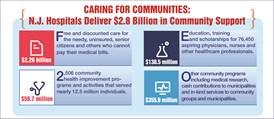NJHA Recognizes Three Organizations for Outstanding Community Programs
 Click to view full size image
Click to view full size image
PRINCETON – New Jersey hospitals provided $2.8 billion in added benefits to their communities in 2013 above and beyond the healthcare services they provided to their patients, according to a new report from the New Jersey Hospital Association.
The total includes the value of free and discounted care for the poor, uninsured and senior citizens; community health offerings like immunization clinics and other wellness programs; education for future healthcare professionals; medical research; and a wide array of additional community programs. The results are reported in the new NJHA report, N.J. Hospitals Caring for Their Community: 2014 Community Benefit Report.
“Even in these times of change, New Jersey’s hospitals continue giving back to their communities in multiple ways,” said NJHA President and CEO Betsy Ryan. “That includes grassroots programs that provide healthcare services deep within the community, education for future healthcare professionals and more than $2.2 billion in unpaid care that is absorbed by the hospitals.”
Data from the report is based on survey responses from 60 hospitals and then extrapolated to represent the broader contributions of New Jersey’s 72 acute care hospitals.
The $2.8 billion in community benefits tallied in the report include:
- $2.2 billion in unpaid costs of patient care, which includes $550 million in unreimbursed charity care services for the working poor, $364 million in unpaid care for Medicare patients and $123 million in unpaid care for Medicaid patients. This amount also includes $1.2 billion in uncollectable costs for treatment, also known as bad debt.
- $58.7 million in community health improvement services, which include programs such as health fairs, health screenings and immunization clinics. About 3,400 programs were held statewide, providing more than 13.5 million unique “personal encounters” between hospitals and community members.
- $138 million in health professions education, which includes education, internships, residency programs, scholarships and other programs to prepare the next generation of physicians, nurses and other healthcare professionals. Over 76,000 current and future healthcare workers were served in these programs.
- $356 million in other community services and programs, many of which go beyond the traditional definition of “healthcare programs.” Hospitals provided over 593 such programs in 2013, providing over 1 million unique personal encounters.
The report also features real-world examples of hospitals’ community benefit programs. These featured programs were honored Friday as NJHA presented its annual Community Outreach Awards. This year’s honorees are: Meridian Health, Inspira Health Network and Monmouth Medical Center, part of Barnabas Health.
- Meridian Health teamed up with the American Heart Association in a landmark, multi-year initiative to Create a Community of Life Savers. This free program works with high schools in Monmouth and Ocean counties to train community members and school staff as CPR instructors, and in the correct use of Automated External Defibrillators. To date, the Create a Community of Life Savers program has trained more than 2,300 students in techniques that can potentially save the life of someone in the school setting as well as prepare them to assist with a life-threatening emergency within the community and throughout their lives.
- Inspira Health Network is helping its chronically ill patients to successfully manage their health conditions through its Coordinating Options Across the Continuum of Health Care (COACH). The program helps to improve their wellbeing and quality of life in the face of substantial health, social and economic complexities and challenges. COACH coordination nurses begin interacting with patients prior to discharge and maintain the relationship for a minimum of 30 days after discharge.
- In healthcare, language barriers can make face-to-face conversations a challenge when trying to make sure patients get the care they need. The Community-Specific Medical Program at Monmouth Medical Center targeted this issue through comprehensive education and resources. The first and only program of its kind in New Jersey, this program targets specific language groups by providing healthcare services in patients’ native languages. It has successfully assisted 3,000 Chinese-speaking patients with more than 5,500 visits and, most recently, approximately 200 Russian-speaking patients.
Click here to read the full report.